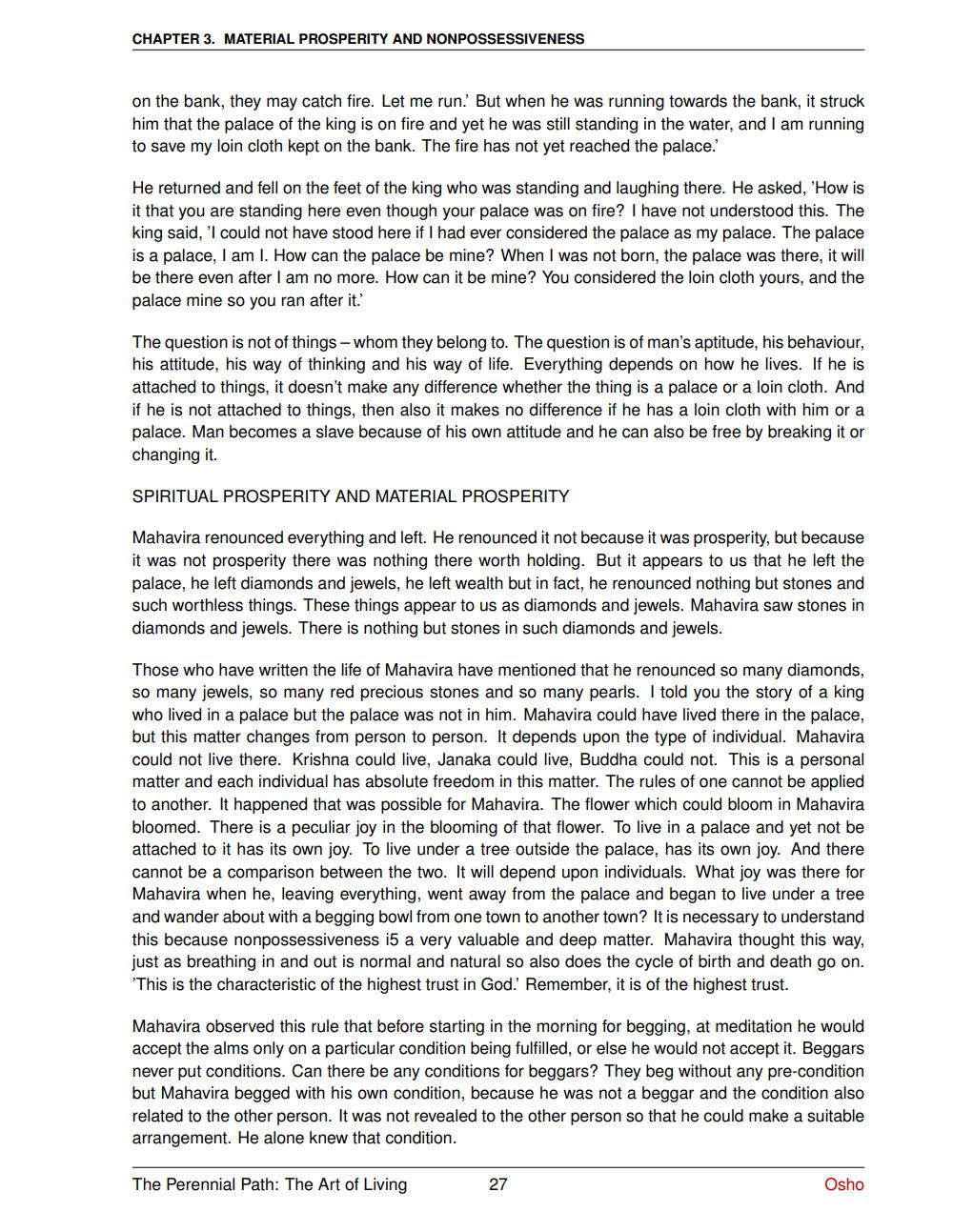________________
CHAPTER 3. MATERIAL PROSPERITY AND NONPOSSESSIVENESS
on the bank, they may catch fire. Let me run.' But when he was running towards the bank, it struck him that the palace of the king is on fire and yet he was still standing in the water, and I am running to save my loin cloth kept on the bank. The fire has not yet reached the palace.'
He returned and fell on the feet of the king who was standing and laughing there. He asked, 'How is it that you are standing here even though your palace was on fire? I have not understood this. The king said, 'I could not have stood here if I had ever considered the palace as my palace. The palace is a palace, I am I. How can the palace be mine? When I was not born, the palace was there, it will be there even after I am no more. How can it be mine? You considered the loin cloth yours, and the palace mine so you ran after it.'
The question is not of things - whom they belong to. The question is of man's aptitude, his behaviour, his attitude, his way of thinking and his way of life. Everything depends on how he lives. If he is attached to things, it doesn't make any difference whether the thing is a palace or a loin cloth. And if he is not attached to things, then also it makes no difference if he has a loin cloth with him or a palace. Man becomes a slave because of his own attitude and he can also be free by breaking it or changing it.
SPIRITUAL PROSPERITY AND MATERIAL PROSPERITY
Mahavira renounced everything and left. He renounced it not because it was prosperity, but because it was not prosperity there was nothing there worth holding. But it appears to us that he left the palace, he left diamonds and jewels, he left wealth but in fact, he renounced nothing but stones and such worthless things. These things appear to us as diamonds and jewels. Mahavira saw stones in diamonds and jewels. There is nothing but stones in such diamonds and jewels.
Those who have written the life of Mahavira have mentioned that he renounced so many diamonds, so many jewels, so many red precious stones and so many pearls. I told you the story of a king who lived in a palace but the palace was not in him. Mahavira could have lived there in the palace, but this matter changes from person to person. It depends upon the type of individual. Mahavira could not live there. Krishna could live, Janaka could live, Buddha could not. This is a personal matter and each individual has absolute freedom in this matter. The rules of one cannot be applied to another. It happened that was possible for Mahavira. The flower which could bloom in Mahavira bloomed. There is a peculiar joy in the blooming of that flower. To live in a palace and yet not be attached to it has its own joy. To live under a tree outside the palace, has its own joy. And there cannot be a comparison between the two. It will depend upon individuals. What joy was there for Mahavira when he, leaving everything, went away from the palace and began to live under a tree and wander about with a begging bowl from one town to another town? It is necessary to understand this because nonpossessiveness i5 a very valuable and deep matter. Mahavira thought this way, just as breathing in and out is normal and natural so also does the cycle of birth and death go on. 'This is the characteristic of the highest trust in God.' Remember, it is of the highest trust.
Mahavira observed this rule that before starting in the morning for begging, at meditation he would accept the alms only on a particular condition being fulfilled, or else he would not accept it. Beggars never put conditions. Can there be any conditions for beggars? They beg without any pre-condition but Mahavira begged with his own condition, because he was not a beggar and the condition also related to the other person. It was not revealed to the other person so that he could make a suitable arrangement. He alone knew that condition.
The Perennial Path: The Art of Living
27
Osho




